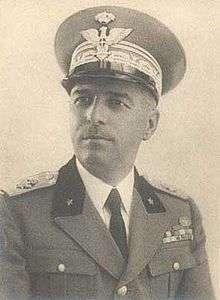Vittorio Ambrosio
| Vittorio Ambrosio | |
|---|---|
 | |
| Born |
28 July 1879 Turin |
| Died |
19 November 1958 (aged 79) Alassio |
| Allegiance |
|
| Service/branch |
|
| Years of service | 1896–1944 |
| Rank | General |
| Commands held | Second Army |
| Battles/wars |
Italo-Turkish War World War I World War II |
| Relations | Ante Nikšić (father-in-law) |
| Other work | Inspector-General of the Army |
Vittorio Ambrosio (28 July 1879 – 19 November 1958)[1][2] was an Italian general who served in the Italo-Turkish War, World War I, and World War II. During the latter conflict, Ambrosio served an instrumental role in the fall of Benito Mussolini and the eventual Italian renunciation of its alliance with Germany.[2]
Before World War II
Ambrosio was a native of Turin.
He started his military career in 1896 when he joined the Military School of Modena; in the early 20th century he was named officier in the cavalry. During the Tripolitanian war, which lasted until 1912, he served with the rank of Tenente in regiment Cavaleggeri di Lucca. In World War I he served as a divisional chief of staff. In 1935 he was appointed to command the XII Army Corps and in 1939 he was promoted to Commander of the Second Army, which was located on the Yugoslav border.[1]
World War II
Ambrosio's early actions in World War II, included leading the Italian offensive in Yugoslavia in 1941. On April 11 his "II Armata" attacked from the north reaching in the next two days -after brief but heavy fighting- Ljubjana and the outskirsts of Zadar; on April 15 Ambrosio conquered Split and Kotor; on April 17 all the Dalmatian coast was in his control: his fast conquests were welcomed by the same Mussolini. In January 1942, he was promoted to Chief of Staff and later appointed Chief of Staff of the general armed forces for the Italian Army in February 1943.[2]
As Chief of Staff, Ambrosio planned to return Italian troops from Ukraine and the Balkans. In May 1943 after a devastating loss at Tunis and the Allied invasion of Sicily Ambrosio attempted to convince Mussolini to pull Italy out of the war and separate from Germany.[1] [1][3] When Mussolini became unable to stand against Adolf Hitler, Ambrosio helped as he was removed from power. After Mussolini was removed from power in July, Ambrosio replaced Ugo Cavallero and served under Pietro Badoglio's military government as the Chief of the Supreme Command (Comando Supremo). In September, Ambrosio helped negotiate an armistice with the Allies. The negotiations took longer than expected and allowed the Germans time to occupy much of Italy.[1]
Ambrosio was eventually demoted to Inspector-General of the army by Badoglio in November 1943 on insistence of the allies who did not trust him.[1][2]
Personal life
Ambrosio married a daughter of Croatian Minister of Interior, Ante Nikšić, in 1942.[4]
See also
References
- Citations
- 1 2 3 4 5 6 Tucker, Spencer C. (2001). Who's Who In Twentieth-Century Warfare. Routledge. p. 6. ISBN 0-415-23497-2.
- 1 2 3 4 Baudot, Marcel (1980). The Historical Encyclopedia of World War II. Facts on File Inc. p. 11. ISBN 0-87196-401-5.
- ↑ Gallo, Patrick (February 28, 2003). For Love and Country. Lanham, Maryland: University Press of America. p. 46. ISBN 978-0-7618-2496-1. Retrieved 2007-06-13.
- ↑ Dizdar et al. 1997, p. 239.
- Bibliography
- Dizdar, Zdravko; Grčić, Marko; Ravlić, Slaven; Stuparić, Darko (1997). Tko je tko u NDH (in Croatian). Minerva. ISBN 953-6377-03-9.